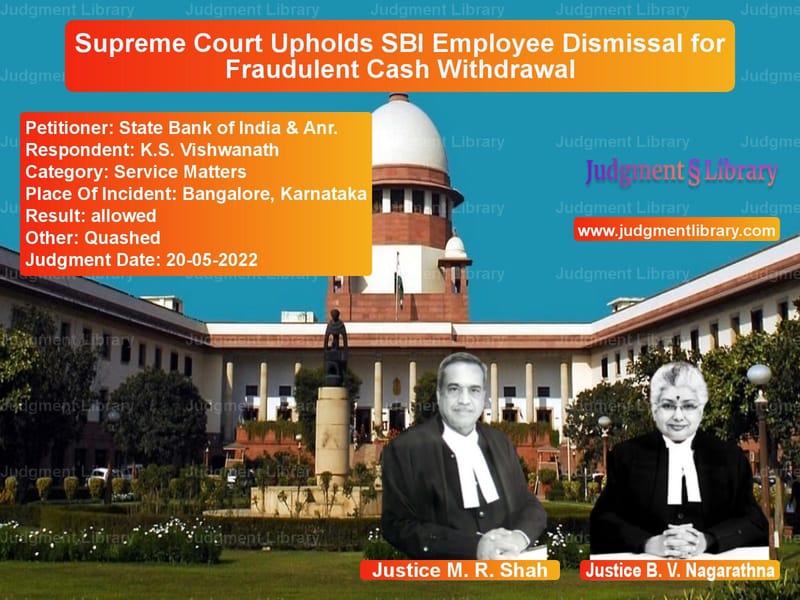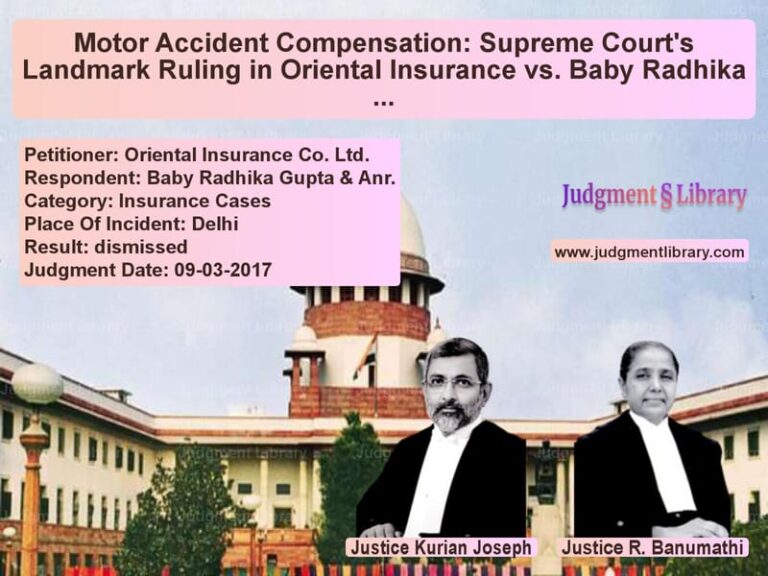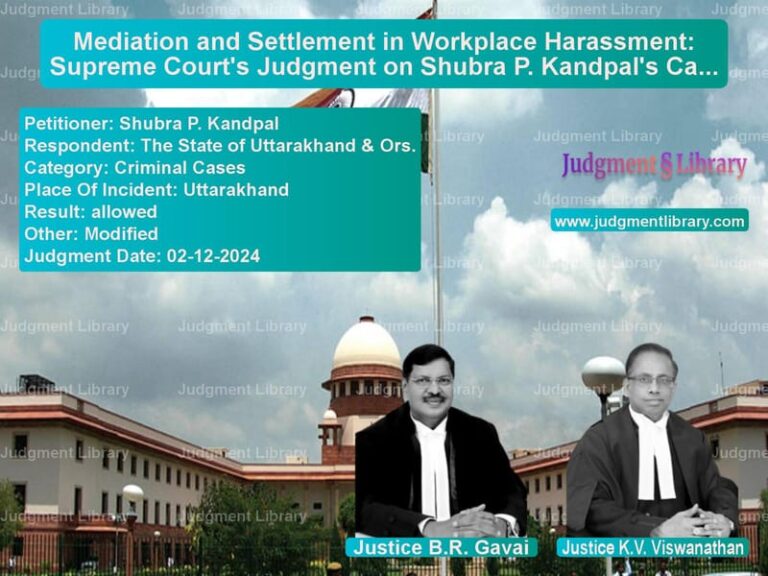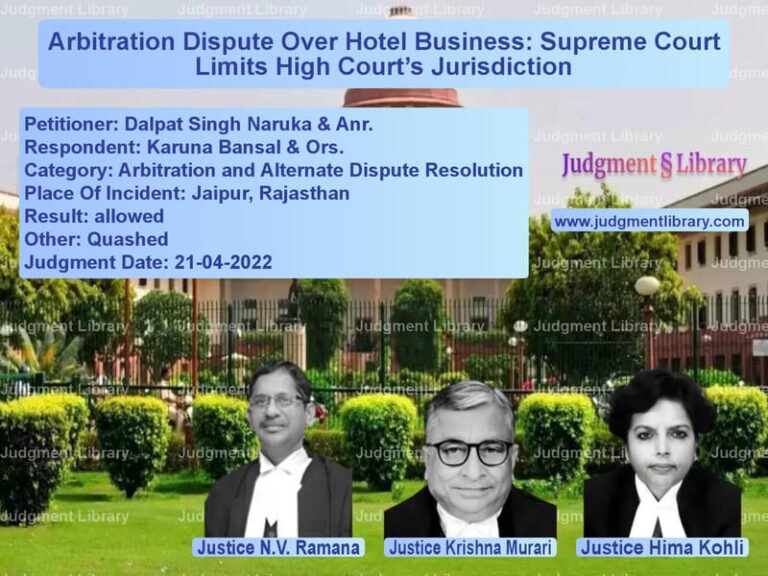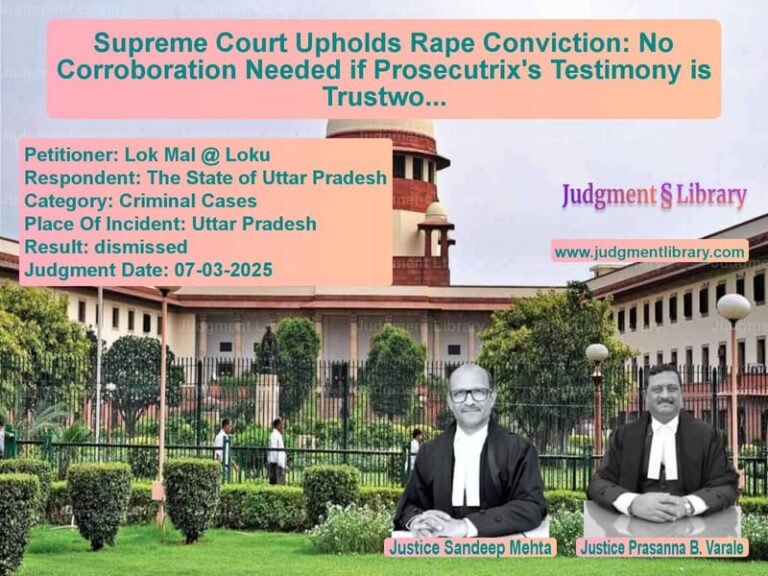Supreme Court Upholds SBI Employee Dismissal for Fraudulent Cash Withdrawal
The case of State Bank of India & Anr. vs. K.S. Vishwanath centered around the dismissal of a bank officer for fraudulently withdrawing Rs.10 lakh using a forged letter. The Supreme Court ruled that the High Court erred in interfering with the disciplinary authority’s decision and reinstating the employee, emphasizing that departmental inquiries operate under a different standard than criminal trials.
Background of the Case
The respondent, K.S. Vishwanath, was employed as a Deputy Manager (Cash) at the SSI Peenya II Stage Branch of the State Bank of India (SBI) in Bangalore. On August 6, 1996, he allegedly withdrew Rs.10 lakh from the Peenya Industrial Estate Branch by presenting a forged letter purportedly signed by the Assistant General Manager (AGM) of the SSI Branch. When the AGM later denied signing the letter, the fraudulent nature of the transaction was exposed.
The fraud came to light when a routine tallying of accounts revealed that the amount had never been recorded as deposited in the bank’s official records. The matter was referred to the Central Bureau of Investigation (CBI), which registered an FIR on November 10, 1998. The respondent was subsequently suspended, and a departmental inquiry was initiated.
Read also: https://judgmentlibrary.com/supreme-court-overrules-rangaiah-new-rules-govern-service-vacancies/
Key Legal Issues
- Whether the disciplinary proceedings against the respondent were conducted fairly and in accordance with law.
- Whether the High Court had the jurisdiction to interfere with the disciplinary authority’s findings.
- Whether the respondent’s acquittal in a criminal trial had any bearing on the disciplinary proceedings.
- Whether the punishment of dismissal was disproportionate to the charges proved.
Arguments Presented
Petitioners’ Arguments (State Bank of India)
- The respondent fraudulently withdrew Rs.10 lakh using a forged letter and failed to deposit the amount in the bank’s records.
- During the departmental inquiry, 41 documents and 9 witnesses provided evidence linking the respondent to the fraudulent withdrawal.
- The High Court exceeded its jurisdiction by re-evaluating evidence, which is not permissible in judicial review.
- The respondent’s acquittal in the criminal case was irrelevant as the standard of proof in disciplinary proceedings is lower than in criminal trials.
- The dismissal order was proportionate to the seriousness of the fraud committed by the respondent.
Respondent’s Arguments (K.S. Vishwanath)
- He had an unblemished service record of 28 years before the alleged incident.
- The fraudulent withdrawal was allegedly carried out by another individual, and there was no direct evidence linking him to the crime.
- The initial internal investigation by the bank had exonerated him.
- The criminal court had acquitted him, granting him the benefit of doubt, which should be considered in the departmental proceedings.
- The High Court correctly found procedural irregularities in the departmental inquiry.
Supreme Court’s Observations
The Supreme Court reviewed the inquiry proceedings and made the following key observations:
- The disciplinary authority had sufficient evidence: The bank had established a complete chain of events proving the respondent’s involvement.
- The High Court exceeded its jurisdiction: Judicial review is limited to ensuring fairness of the disciplinary process, not re-evaluating evidence.
- Acquittal in a criminal trial does not affect disciplinary proceedings: The standard of proof in criminal cases is beyond reasonable doubt, whereas in disciplinary proceedings, it is based on a preponderance of probabilities.
- The punishment was justified: Given the gravity of the fraud, the respondent’s dismissal was not disproportionate.
Key Excerpts from the Judgment
The Supreme Court ruled:
“The High Court erred in interfering with the disciplinary authority’s findings, as the evidence on record sufficiently proved the respondent’s misconduct.”
The Court further observed:
“The acquittal of the respondent in a criminal case, where he was given the benefit of doubt, does not ipso facto invalidate the findings of the disciplinary inquiry.”
Final Verdict
- The Supreme Court quashed the High Court’s order reinstating the respondent.
- The disciplinary authority’s order of dismissal was restored.
- The respondent was held liable for fraud and was not entitled to any further benefits.
Outcome: This ruling reaffirms that High Courts cannot act as appellate bodies in disciplinary cases and that acquittal in criminal trials does not automatically exonerate employees in departmental inquiries.
Petitioner Name: State Bank of India & Anr..Respondent Name: K.S. Vishwanath.Judgment By: Justice M. R. Shah, Justice B. V. Nagarathna.Place Of Incident: Bangalore, Karnataka.Judgment Date: 20-05-2022.
Don’t miss out on the full details! Download the complete judgment in PDF format below and gain valuable insights instantly!
Download Judgment: state-bank-of-india-vs-k.s.-vishwanath-supreme-court-of-india-judgment-dated-20-05-2022.pdf
Directly Download Judgment: Directly download this Judgment
See all petitions in Disciplinary Proceedings
See all petitions in Termination Cases
See all petitions in Public Sector Employees
See all petitions in Judgment by Mukeshkumar Rasikbhai Shah
See all petitions in Judgment by B.V. Nagarathna
See all petitions in allowed
See all petitions in Quashed
See all petitions in supreme court of India judgments May 2022
See all petitions in 2022 judgments
See all posts in Service Matters Category
See all allowed petitions in Service Matters Category
See all Dismissed petitions in Service Matters Category
See all partially allowed petitions in Service Matters Category

